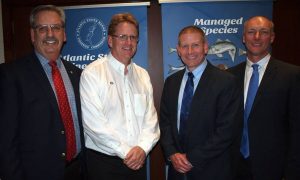May 20, 2021 — The Second World Ocean (WOAII) Assessment, launched in April, serves as an important tool to aid in policy making for world leaders. As part of the United Nation’s Regular Process for Global Reporting and Assessment of the States of the Marine Environment, the effort behind creating the assessment relies on the expertise of hundreds of co-authors and leading experts worldwide.
The report details new research, gaps in knowledge, and current knowledge about the state of the world’s oceans and the many pressures they are under, as described by United Nations Secretary-General Antonio Guterres in his speech for the launch event for the report.
Peter Auster, UConn Research Professor Emeritus of Marine Sciences and Senior Research Scientist at Mystic Aquarium, was one of the expert co-authors of the report. He recently met with UConn Today to answer some questions about the latest state of the ocean assessment.

